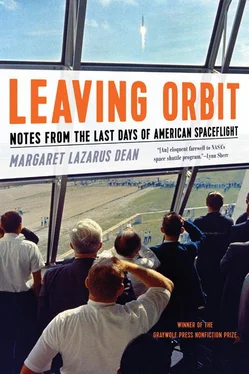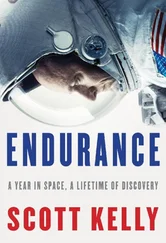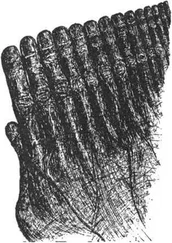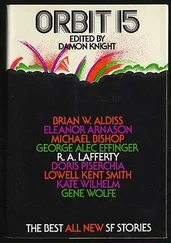In my dreams, sometimes, I still return to the Vehicle Assembly Building. The other night, I dreamed I found myself sitting in its vast interior on a beige metal folding chair, in a field of folding chairs, the rain clouds swirling 525 feet above our heads, just under the vanishingly far-off ceiling windows. The folding chairs are flimsy and they keep trying to close themselves under us, their rubber feet skittering on the hard concrete of the Vehicle Assembly Building floor. I know without being told that these chairs have been set up for all the writers who have written about the American space program, though most of the chairs appear to be empty. Norman Mailer is sitting next to me, which makes me faintly nervous. I can also make out Tom Wolfe, Jay Barbree, J. G. Ballard, Lynn Sherr, Oriana Fallaci, Walter Cronkite, and fields of others, some long dead. Nearly all are men, nearly all are white. It occurs to me that we space writers are all asked the same question all the time: Would you go? Mostly we say yes, but we know we are lying. We’ll never be given the chance anyway. We all feel Norman’s masculine envy at being left behind, but our envy is beside the point. We know that someone needs to stay behind and write about what it feels like to watch it from the ground.
We wait on our folding chairs. We are waiting for something to happen, but we wait and wait and it never gets started.
MILESTONES OF AMERICAN SPACEFLIGHT
Precursors
• March 1926:First successful liquid-fueled rocket launched by American physicist Robert Goddard
• October 1942:Successful German test launch of the first ballistic missile, the V-2, later used on Allied cities near the end of World War II combat in Europe
• October 1947:Sound barrier broken by American test pilot Chuck Yeager
• October 1957:Soviet Union launch of Sputnik, the first artificial satellite; beginning of the space race
• February 1958:Launch of the first American satellite, Explorer 1
• July 1958:Establishment of the US National Aeronautics and Space Administration (NASA)
• April 1961:First human spaceflight: Soviet cosmonaut Yuri Gagarin
The Heroic Era: Mercury, Gemini, Apollo (1959–1972)
Project Mercury: Putting the First Americans in Space (1959-1963)
Six single-astronaut missions
• May 1961:First American to travel into space: Alan Shepard
• May 1961:President John F. Kennedy’s charge to Congress to put a man on the moon by the end of the decade
• February 1962:First American to orbit Earth: John Glenn
Project Gemini: Moving toward the Moon (1962–1966)
Ten missions to develop hardware and techniques for travel to the moon
• March 1965:First flight to carry two astronauts
• June 1965:First American spacewalk: Ed White
• December 1965:First rendezvous of two American spacecraft
• March 1966:First docking of two American spacecraft
Project Apollo: Walking on the Moon (1963–1972)
Eleven crewed missions, including six successful trips to the lunar surface
• January 1967:All three Apollo 1 astronauts—Roger Chaffee, Gus Grissom, and Ed White—killed in a cabin fire during a launchpad test
• December 1968:First trip to lunar orbit on Apollo 8
• July 1969:Apollo 11 crew makes first moon landing; Neil Armstrong and Buzz Aldrin walk on moon
• April 1970:Apollo 13 crew prevented from landing on the moon by oxygen tank explosion
• July 1971:First use of lunar rover on Apollo 15
• December 1972:Final moon landing Apollo 17
The Shuttle Era: Ongoing Access to Low-Earth Orbit (1981–2011)
135 total flights of the orbiters Columbia, Challenger, Discovery, Atlantis, Endeavour —133 successful missions and two disasters resulting in loss of spacecraft and crew. Deployment and repairs to satellites, including the Hubble Space Telescope; assembly of the International Space Station over 37 missions.
• April 1981:First test flight of space shuttle Columbia
• June 1982:Last test flight of Columbia ; shuttle program officially operational
• April 1983:First flight of Challenger ; first shuttle spacewalk
• June 1983:First American woman in space: Sally Ride
• August 1983:First African American in space: Guy Bluford
• August 1984:First flight for Discovery
• October 1985:First flight for Atlantis
• January 1986:Explosion of Challenger 73 seconds after launch, destroying the spacecraft and killing all seven crew members, including teacher Christa McAuliffe
• May 1989:Venus probe Magellan deployed
• October 1989:Jupiter probe Galileo deployed
• April 1990:Hubble Space Telescope deployed
• May 1992:First flight for Endeavour
• June 1995:First shuttle docking with Russian space station Mir
• December 1998:First International Space Station assembly mission
• February 2003:Breakup of Columbia upon reentry of Earth’s atmosphere, destroying the spacecraft and killing all seven crew members
• February 2011:Final flight for Discovery
• May 2011:Final flight for Endeavour
• July 2011:Final flight of the space shuttle program (Atlantis)
* * *
The remaining shuttles become museum displays : Discovery at National Air and Space Museum, Washington, DC ; Atlantis at Kennedy Space Center Visitor Complex, Florida ; Endeavour at California Science Center, Los Angeles.
Aldrin, Buzz, with Ken Abraham. Magnificent Desolation: The Long Journey Home from the Moon. New York: Harmony/Random House, 2009.
Burrows, William E. This New Ocean: The Story of the First Space Age. New York: Random House, 1998.
Cabbage, Michael, and William Harwood. Comm Check…: The Final Flight of Shuttle Columbia. New York: Free Press/Simon & Schuster, 2004.
Cernan, Eugene, with Don Davis. The Last Man on the Moon: Astronaut Eugene Cernan and America’s Race in Space. New York: St. Martin’s, 1999.
Chaikin, Andrew. A Man on the Moon: The Voyages of the Apollo Astronauts. New York: Viking, 1994.
Collins, Michael. Carrying the Fire: An Astronaut’s Journeys. 40th anniversary ed. New York: Farrar, Straus and Giroux, 2009.
Fallaci, Oriana. If the Sun Dies. Translated by Pamela Swinglehurst. New York: Atheneum, 1966.
Feynman, Richard P. “What Do You Care What Other People Think?”: Further Adventures of a Curious Character. New York: Bantam, 1989.
Fuson, Robert H. Juan Ponce de León and the Spanish Discovery of Puerto Rico and Florida. Blacksburg: McDonald and Woodward, 2000.
Government Printing Office. Columbia Accident Investigation Board Report. Washington, DC: US Government Printing Office, 2003.
Hansen, James R. First Man: The Life of Neil Armstrong. New York: Simon & Schuster, 2005.
Читать дальше









